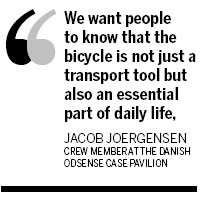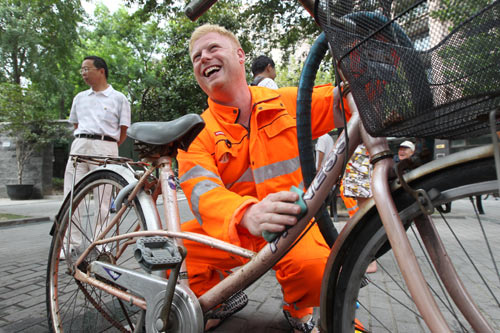Life and Leisure
Two-wheel diplomacy
By Yu Ran (China Daily)
Updated: 2010-10-01 11:21
 |
Large Medium Small |
|
|
Some young Danes are out to share their culture with China, and they are stopping cyclists in their tracks. Yu Ran finds out why.
Jacob Joergensen, 27, is part of the crew at the Danish Odense Case Pavilion at the Shanghai Expo. But lately, Joergensen has taken to the streets with a mission.
He and a group of friends are stopping Shanghai's cyclists with the offer to repair and clean their two-wheelers as part of a campaign to promote cycling culture, the Danish way.
For Joergensen and his friends, the main message they are sending out is that bicycles need to be well taken care of, just like cars.
Decked out in bright orange jackets, Joergensen and his colleagues set up a temporary bicycle maintenance spot at Mengzi Road and Jumen Road at Luwan district. They were helped by a group of secondary-school students from Sct Hans Middle School in Odense.
A local bicycle mechanic, Ren Litao, was also hired to help with the repairs.
Team members were on their knees, cleaning up and wiping the dust off the bicycles. All the two-wheelers had a new bell installed, and the owners were also handed pins from the Odense Pavilion as gifts.
"This is not the first time we are sharing our cycling culture with local residents. We held the first free bicycle washing event at the end of July, and it was warmly received by the local residents."
Joergensen spoke to the cyclists in fluent Chinese and made jokes in the Shanghai dialect. While fixing up the bikes, he was also giving out suggestions on how they should clean and wax their bikes regularly.
Local bikers, impressed with the spirit of the young Danes, have compared them to Lei Feng (1940-1962), the Chinese soldier who was once a model of good service and selflessness.
"We want the people to know that the bicycle is not just a transport tool but also an essential part of daily life," Joergensen says, which is how it is treated in his own country.
He started learning Chinese four years ago and took another 10-month Chinese course in Nanjing two years ago. He also did an internship with the Danish Innovation Center in Shanghai under the ministry of environment and science in Denmark.
"For me, the best way to practice my Chinese is to work at the Expo, so I applied for the position at Odense Case." And he is enjoying his job every day, guiding tourists around the pavilion.
"They're very surprised that those tall foreign guys can speak fluent Chinese."

Odense Case Pavilion uses a Spinning Wheels theme. It revolves around the city of Odense, where the bicycle is more than a means of transportation - but a way of life.
The first bicycle lane in Denmark was built in Odense more than a hundred years ago, and now there are more than 510 kilometers of lanes in the city where nine out of 10 citizens own a bicycle.
Proper and regular maintenance of the bicycle is the tradition in Denmark.
Odense is also the birthplace of Hans Christian Andersen, whose fairytales are world-famous. It is also renowned for its cycling culture and urban planning while sustainability and smart solutions are considered essential elements for a livable city, a city for the future.
"You find the bicycle at the center of our exhibition: spinning around innovative thinking, environmentally friendly choices and healthy living," Joergensen says.
The citizens of Odense are among the most enthusiastic cyclists in the world, but here in Shanghai, Joergensen is finding it difficult to ride a bike freely.
"In Shanghai, cars have right of way while it's quite the opposite in Europe," he says.
For Joergensen, his immediate wish is to see more cyclists riding safely on the streets in Shanghai without having to worry about getting into accidents. He feels strongly that the bicycle culture that has been passed down for generations in Denmark should be shared with China.
